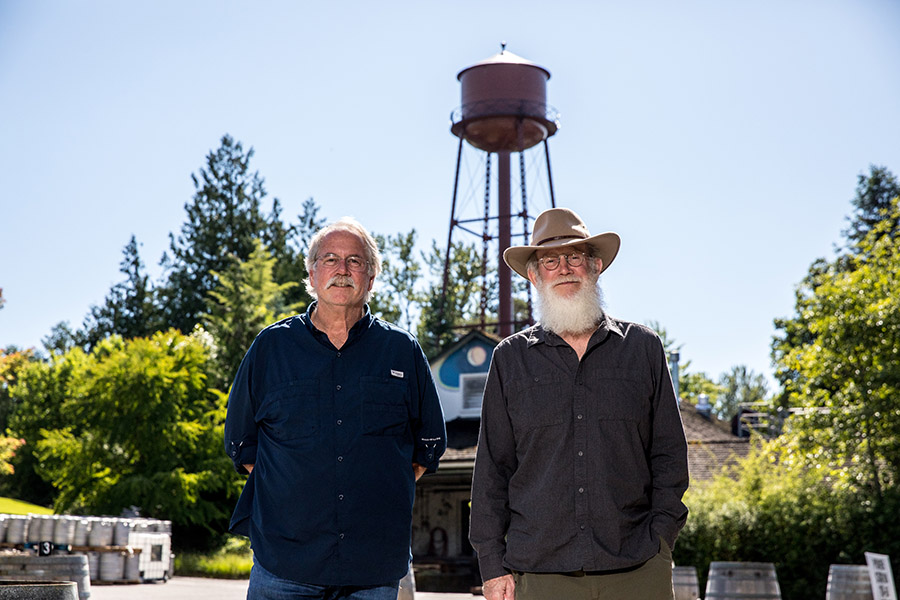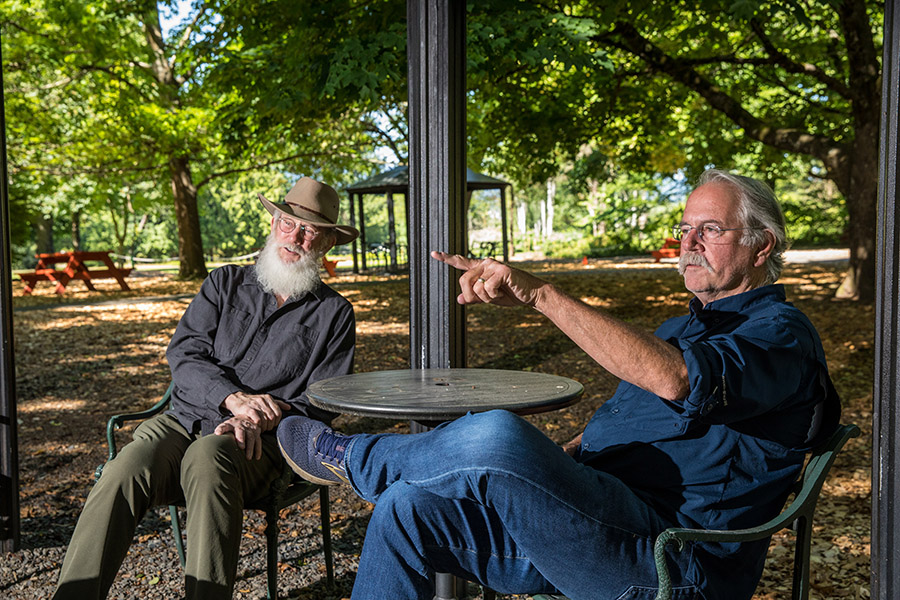McMenamins, the iconic chain of hotels and brewpubs, seeks financial partners amid a pandemic that attacks its business model from all sides.
When Mike McMenamin purchased the Barley Mill Pub in Portland in 1983 his goal was to offer a different kind of pub experience.
After traveling around Europe with his wife, Mike was enchanted by the neighborhood-style pub culture, where friends and neighbors could drink and eat together after a day’s work, where local musicians would play their tunes and where children were welcome.
 McMenamin brothers Brian, left, and Mike at Edgefield Photo: Jason Kaplan
McMenamin brothers Brian, left, and Mike at Edgefield Photo: Jason Kaplan
It was a brewpub based around community, and 55 locations and more than 3,500 employees later, the signature sun and moon artwork of the McMenamins brewpub has achieved iconic status in the Northwest, both for its whimsical neighborhood vibe, and for its commitment to rescuing and renovating historic sites to use as new pubs, hotels and performance venues for communities to gather.
But with the onset of COVID-19, community gathering can seem a distant memory.
The neighborhood atmosphere that sets McMenamins apart from the competition is tested by a disease that puts the breaks on large groups. Fear from consumers, as well as social-distancing requirements, have caused many businesses in the hospitality sector to shut their doors, some for good.
Around 5% of Oregon restaurants have closed permanently, according to a survey by the National Restaurant Association. Most do not have the economic stability to survive another four months of pandemic.
As a brewpub chain, lodging provider and performance venue, McMenamins has been hit from all sides by the pandemic. Total revenue is down 50%.
Owners Mike and Brian McMenamin say they have overcome difficulties getting people to feel comfortable in their establishments before.
“When we first started out, they said we were in a rough neighborhood, and if we didn’t board them up, someone would smash the windows. It was difficult to get people to come through the doors at first. It was a struggle to survive,” says Mike. “We’re right back there again.”
In May, the brothers put out a call for investors on the company website, with the goal of raising $20 million through preferred stock offerings.
While the brothers say they have multiple projects coming down the pipeline, including an expansion of Cornelius Pass Roadhouse in Hillsboro and a new bottling operation, they say the money will be used to retire short-term debt.
 Mike McMenamin, left, and brother Brian at Edgefield Photo: Jason Kaplan
Mike McMenamin, left, and brother Brian at Edgefield Photo: Jason Kaplan
The call for investment is the first time the brewpub chain has offered direct ownership of the company to anyone outside the McMenamin family. The founders view the call for investment as an opportunity for like-minded people to be able to own a part of the company.
Mike compares investing in McMenamins to investing in a cause. “We love working with people who are into music, literature, architecture and restoration. This place offers a lot to the community and businesses that can use the pub.This has been a great chance to go to the people who have really supported us.”
The minimum investment begins at $100,000.
Since they put out the call a month ago, the owners say the response from the community has been heartwarming. The brothers have already received more than a hundred calls from people interested in investing.
The company laid off thousands of staff as a result of the pandemic, and while McMenamins has since rehired around 2,000 staff members, and opened 29 of its 55 locations, the company is still very much in survival mode.
The owners stay busy by keeping an eye on the future. Mike is most excited about renovating the recently purchased Multnomah County Correctional Facility at Edgefield in Troutdale into a hotel.
Guests will be locked into jail cells with bunks and stainless-steel toilets, before opening up a secret panel into their suite or into the bar – akin to an escape room experience.
“You have to keep your experimental mindset. Sometimes your passion can get lost on other parts of the businesses but you have to keep going after it,” says Mike.
In addition to brainstorming other projects, they have continued to experiment with new beverages as well updating their old beer flavors with new ingredients. They are also seeking to increase their farm holdings.
In the meantime, McMenamins has had to adapt to the changing times like every other restaurant. It has put together party packages for delivery, begun installing drive-through windows, and has put tents up around tables and tape on the floors to mark social-distancing requirements.
One unique factor McMenamins has to contend with is that many of its locations are inside historic buildings, such as the Bagdad Theatre in Portland and the Gearhart Hotel.
While these historic locations are perfect for an intimate community experience, the layout of the narrow hallways and winding staircases are not conducive to social distancing.
While delivery, dining apps and drive-through will be a bigger part of McMenamins’ business model going forward, the brewpub chain will never be back to its old self without the vibrant neighborhood atmosphere that made it successful in the first place.
Without local music, crowded tables and neighbors eating meals side by side, McMenamins will have lost an integral part of its brand.
But the owners remain optimistic. They say that customers’ aversion to close-quarters gathering is not the new normal, and they expect there to be a pent-up desire to gather together once the pandemic clears up, whenever that may be.
“Everybody talks about the “new normal,” but I think the reality is that people want to get together. Nothing beats sitting around the table and chewing the fat, all the neighborhood characters coming to life. It’s one of the greatest joys on the planet,” says Mike.
“If that ever goes away, we’re in trouble.”
To subscribe to Oregon Business, click here.








